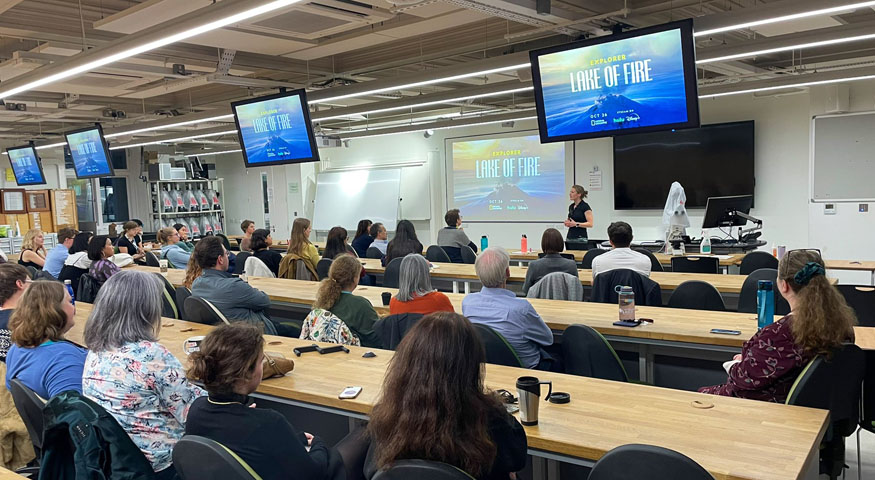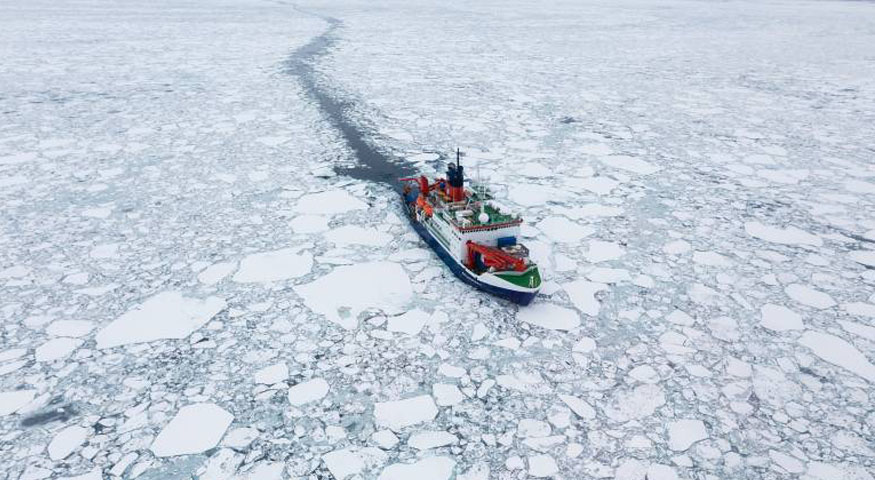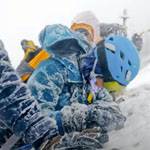Departmental Newsletter Autumn 2023
Student Experience: The Rocky Road
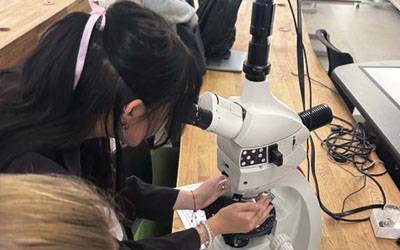
My modules have ignited flames that I know will burn bright into the future - a passion for evolution, the origin of life, isotopic geology and geochemistry.
Meet the Staff: New Staff Introduction
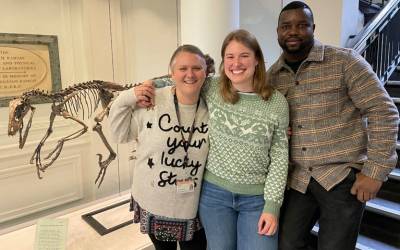
A warm welcome to our newest academic staff: Penelope, Lizzy & Udeme. We are delighted to have you join our department!
PhD News: Arctic research expedition
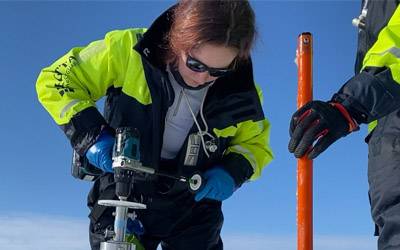
We investigated the biogeochemical properties of sea ice, its overlying snow cover and the underlying ocean.
Outreach: One Minute Geology
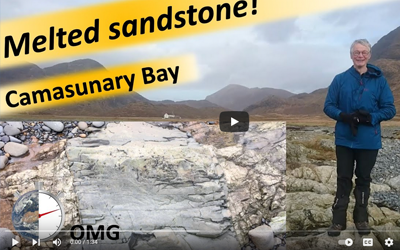
A resource for teachers, field leaders & interested individuals was founded by Prof David Dobson in the autumn of 2021
Research: Laser scanning the snow
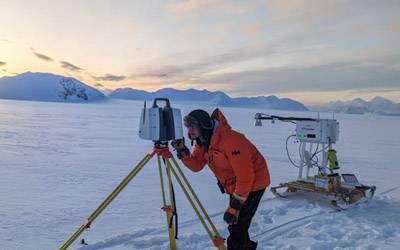
Dr Robbie Mallett, used The Terrestrial Laser Scanner to map the centimetre-scale roughness of snow on sea ice in Antarctic.
Research: What diamonds can reveal?
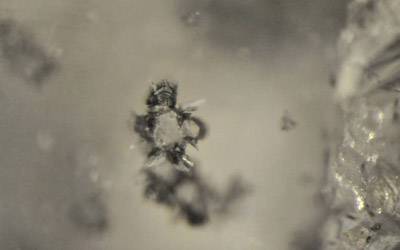
‘Perfect time capsules’: Ancient, "superdeep" diamonds reveal new clues to Earth’s geological evolution.
Events: The Alumni Dinner Returns!
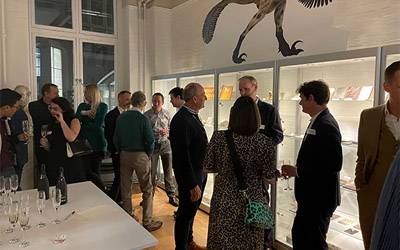
The Dinner itself also marked the retirement of 4 Profs who between them had worked in the Department for more than 125 years!
Publication: Born of Ice and Fire
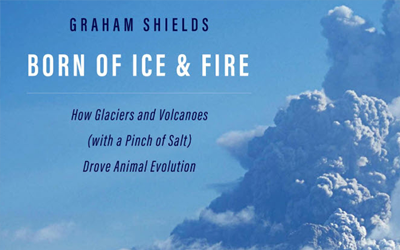
An exploration of how the Cryogenian Period, when our planet was covered in ice for millions of years, created today’s remarkable biodiversity.
Equality: Decolonising the Geosciences
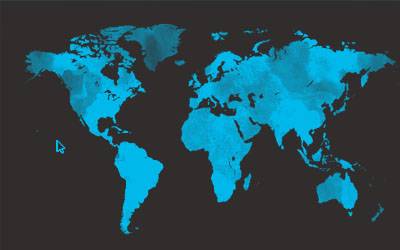
Exploring the role of colonial and imperial legacy upon our Earth Sciences curriculum.
Update from Prof Lidunka Vočadlo, Head of Department.
My first few months as Head of Department have been very interesting – lots going on, lots to think about, lots to achieve. Firstly, we have five new hires since the last Newsletter – Dr Udeme Dickson as a Teaching Lecturer in Environmental Geoscience, Professor Peter Clift as a Royal Society Wolfson Fellow, Dr. Lizzy Steell, a Teaching Lecturer in Palaeontology, Dr. Penelope Wilson, a Teaching Lecturer in Earth Sciences, who is also our new Undergraduate Tutor, and finally Julie Brown, the new Manager of the Bloomsbury Environmental Isotope Facility (BEIF). We also welcome our Teaching Fellow, Alex Steele onto permanent staff as a Teaching Lecturer. We are in the process of recruiting five members of technical staff and one member of administrative staff. This has partly been driven by the retirement of John Bowles and also by the departure of Gary Tarbuck who is moving on to Oxford. John had been with us for decades and knew absolutely everything about the nuts and bolts of the Department and the College, while Gary has been the mainstay of the geochemistry laboratories for many years. Both will be greatly missed.
We start the academic year with another bumper crop of ~100 undergraduate students and ~30 postgraduate taught students, keeping us all on our toes. Teaching remains a firm focus of our remit, with continuing ongoing work to maintain our teaching excellence. For this academic year, we have revamped all our degrees to make them more logical and coherent, with lots of interesting flexibility in the final years. Fieldwork takes students now to Dorset, the Peak District, Scotland, Spain, the Pyrenees, Germany and the Azores. And for fun, we have just begun a termly Disaster Movie Night for undergraduates, organised by our fabulous new Undergraduate Tutor, Penelope Wilson.
Research is also a primary focus for the Department, and is especially driven by our wonderful postdocs and PhD students. Much of this is facilitated through research funding following successful grant applications. Since the last newsletter we saw Peter Irvine, Andrew Thomson, Tom Mitchell and Bridget Wade gaining grant income for a diverse selection of projects ranging from solar radiation management to X-ray tomography of geological materials at extreme conditions, from rates of ice fracture to biostratigraphy over the last 35 million years. We really do cover a wide range of exciting research activity.
Our EDI subgroups are very active with several WiES (Women in Earth Science) events as well as one for Black History Month and one for World Mental Health Day - all very well attended.
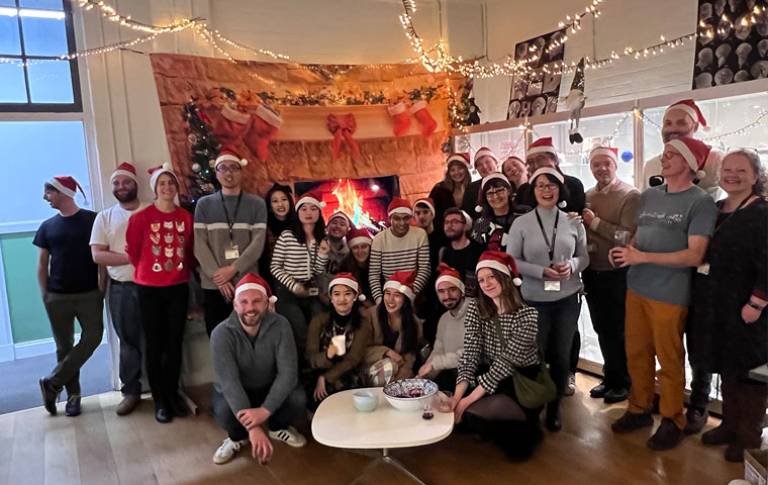
Other highlights in recent months include:
- Undergraduates Shannon James and Rose Meadows are joint winners (with Luciano et al from maths) of the student prize in the MAPS Embedding EDI into Education with their project "Decolonisation of the Curriculum: Digging into its Colonial Roots".
- Katie McFall is part of the successful cross-institution Mineral Resources NERC CDT bid - Training and Research Group for Energy Transition Mineral Resources (TARGET)
- The Women in Earth Sciences (WiES) screening of Emma Nicholson’s National Geographic South Sandwich Island DisneyPlus adventures and a WiES careers workshop for students with Nikki Baxter from the UCL Careers Service.
- The return of our Alumni Dinner – this year with extra sparkle for retirees Juergen Thurow, Phil Meredith, Willy Burgess and Adrian Jones – which attracted over 40 people including the return of other retired staff including Wendy Kirk, Tony Hurford, Monica Mendelssohn and Nicola Marlow; and a guest appearance by David Price turning up after being kicked out of his own leaving do in the Cloisters. Geologists know how to have a good party.
- MAPS Faculty Prizes 2023: Linus Boselius received the Jackson Lewis Scholarship and Princess Buma and Raheen Butt made the Dean’s List.
- Our congratulations also go to Steve Hicks for getting the 2024 Outstanding Early Career Scientist Award for EGU's Seismology division.
- We announce our new UCL Earth Sciences Kathleen Lonsdale Scholarship – a PhD studentship with an EDI focus.
Finally, nothing gets achieved without the hard work and support of our fabulous staff – academics and professional services alike – and also the postdocs and PhD students who we rely on completely to help us achieve excellence in both research and teaching.
 Close
Close


